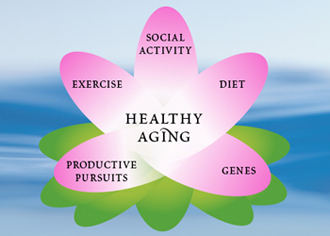Searching for keys to healthy aging
S. Michal Jazwinski, a geneticist who has studied the aging process for more than 25 years, might be expected to say that the secret to a long and healthy life span is all in the genes. But he points out other factors diet, exercise, productive pursuits and social activity that contribute to living long and well.

Genes are just one factor in having a long and healthy life. Diet, exercise, productive pursuits and social activity are important as well. (Illustration by Tracey O'Donnell)
Genes do matter, though. Jazwinski is the director of the Tulane Center for Aging and a professor of medicine and biochemistry. He holds the John W. Deming, MD, Regents Chair in Aging.
Jazwinski pioneered using the yeast model for aging research. He has uncovered genes that play a role in determining life span and the aging process. Garden-variety baker's yeast the kind that causes dough to rise in bread-making and wine and beer to ferment “is a great genetic model,” he says.
Jazwinski was the first scientist to clone or isolate a longevity-associated gene in any organism. And because he was the first to identify this gene, he got to name it LAG1 (Longevity Assurance Gene).
Recently, he and his colleagues have generated a hypothetical model involving three human genes, ApoE, H-Ras and LASS (human LAG1), predicting and then showing that they interact in longevity and healthy aging.
The human biological system is quite complex, says Jazwinski. Involving networks of different reactions all going on at the same time, each affecting the other, there is “a narrow window where everything seems to work nicely,” he says. “But you can only go so far in tweaking a certain gene and its expression to increase life span.”
What Jazwinski says that he and his colleagues are most interested in is healthy aging in humans.
“The whole idea is to compress morbidity, to make the period of decline [before death] as short as possible, so that everyone can die young at an old age.”
In recognition of his contributions to the field of aging research, the Gerontological Society of America has chosen Jazwinski for the Robert W. Kleemeier Award. He'll receive the award at the society's annual meeting in November in Boston.
